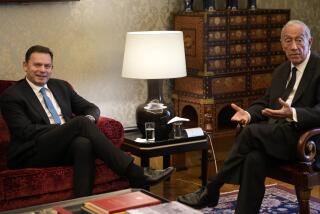How Paul Ryan’s tale of a little boy and a brown-bag lunch fell apart
NATIONAL HARBOR, Md. -- What happened to Paul Ryan at CPAC should stand as a warning to all politicians who decide to humanize their policy positions with anecdotes: Make sure the story you are telling is real.
You will be truth-squadded.
You will be flyspecked.
And if it turns out you failed to verify a “true” story that seemed too good to be true, or tortured a story to make it fit your larger point, your credibility will take a hit.
On Thursday, Ryan stepped into a small mess at Conservative Political Action Conference when he repeated a story about a little boy who preferred a brown-bag lunch from home to a free school lunch. The Republican chairman of the House Budget Committee has taken a recent interest in federal anti-poverty programs lately, and he used the anecdote to illustrate the evil of government dependency. But after several journalists investigated, the story disintegrated like a wet paper lunch bag.
Here’s what Ryan said, in context:
Take “Obamacare.”... We now know that this law will discourage millions of people from working. The left thinks this is a good thing. They say, hey, this is a new freedom -- the freedom not to work. I don’t think the problem is too many people are working. I think the problem is, not enough people can find work.
And if people leave the workforce, our economy will shrink. There will be less opportunity, not more. The left is making a big mistake here. What they’re offering people is a full stomach and an empty soul. The American people want more than that.
You know, this reminds me of a story I heard from Eloise Anderson. She serves in the Cabinet of my buddy, Gov. Scott Walker. She once met a young boy from a very poor family. And every day at school, he would get a free lunch from a government program. He told Eloise he didn’t want a free lunch. He wanted his own lunch, one in a brown paper bag just like the other kids. He wanted one, he said, because he knew a kid with a brown paper bag had someone who cared for him.
This is what the left does not understand. We don’t want people to leave the workforce. We want them to share their skills and their talents with the rest of us. People don’t just want a life of comfort. They want a life of dignity. They want a life of self-determination. A life of equal outcomes is not nearly as enriching as a life of equal opportunity.
While conservative outlets hailed the story as one that “explains the difference between hard work and dependency,” which it most certainly did not, Glenn Kessler of the Washington Post’s Fact Checker sniffed a fake.
Kessler discovered that Eloise Anderson, secretary of the Wisconsin Department of Children and Families, told the story last July during a congressional hearing about the food-stamp program.
In her telling, Kessler said she’d met the little boy herself, and her preposterous point was that giving children free lunches undermines parental obligation: “I think we need to be very careful about how we provide programs to families that don’t undermine families’ responsibilities,” she told Congress, as Kessler discovered when he checked the record.
In a roundabout way, through comments on the TPM website, a blogger on the snarky site Wonkette discovered that the story seemed to have been lifted from a memoir called “The Invisible Thread” about a friendship between a middle-aged white woman and an African American boy she befriended on the streets of New York.
“Invisible Thread” author Laura Schroff offered to give the boy lunch money, but he said he wanted her to make lunches for him and put them in a brown paper bag, “because when I see kids come to school with their lunch in a paper bag, that means someone cares about them. Miss Laura, can I please have my lunch in a paper bag?”
Kessler tracked down a spokesman for Anderson, who told him that Anderson had seen the boy at the heart of “The Invisible Thread,” whose name is Maurice Mazyck, tell his story during a television interview. But she never met him, her spokesman told Kessler.
Late Thursday night, “Invisible Thread” author Schroff contacted the Huffington Post. She said her book was in no way political and she expressed surprise that her story was being used to illustrate the dangers of free school lunches.
“I want people to think about what they can do to make the world a kinder world,” she told the HuffPo. “I don’t care about Republicans and Democrats. But we are talking about children that need to be fed. Cutting school lunch programs doesn’t accomplish that.”
By that time, however, Ryan had already backtracked.
On his Facebook page, he wrote:
“Today at CPAC, I shared a story I heard from Eloise Anderson, the secretary for children and families for the state of Wisconsin. She mentioned it in her testimony for a House Budget Committee hearing last year. I have just learned that Secretary Anderson misspoke, and that the story she told was improperly sourced. I regret failing to verify the original source of the story, but I appreciate her taking the time to share her insights.”
ALSO:
Twitter: @robinabcarian
More to Read
Start your day right
Sign up for Essential California for news, features and recommendations from the L.A. Times and beyond in your inbox six days a week.
You may occasionally receive promotional content from the Los Angeles Times.







